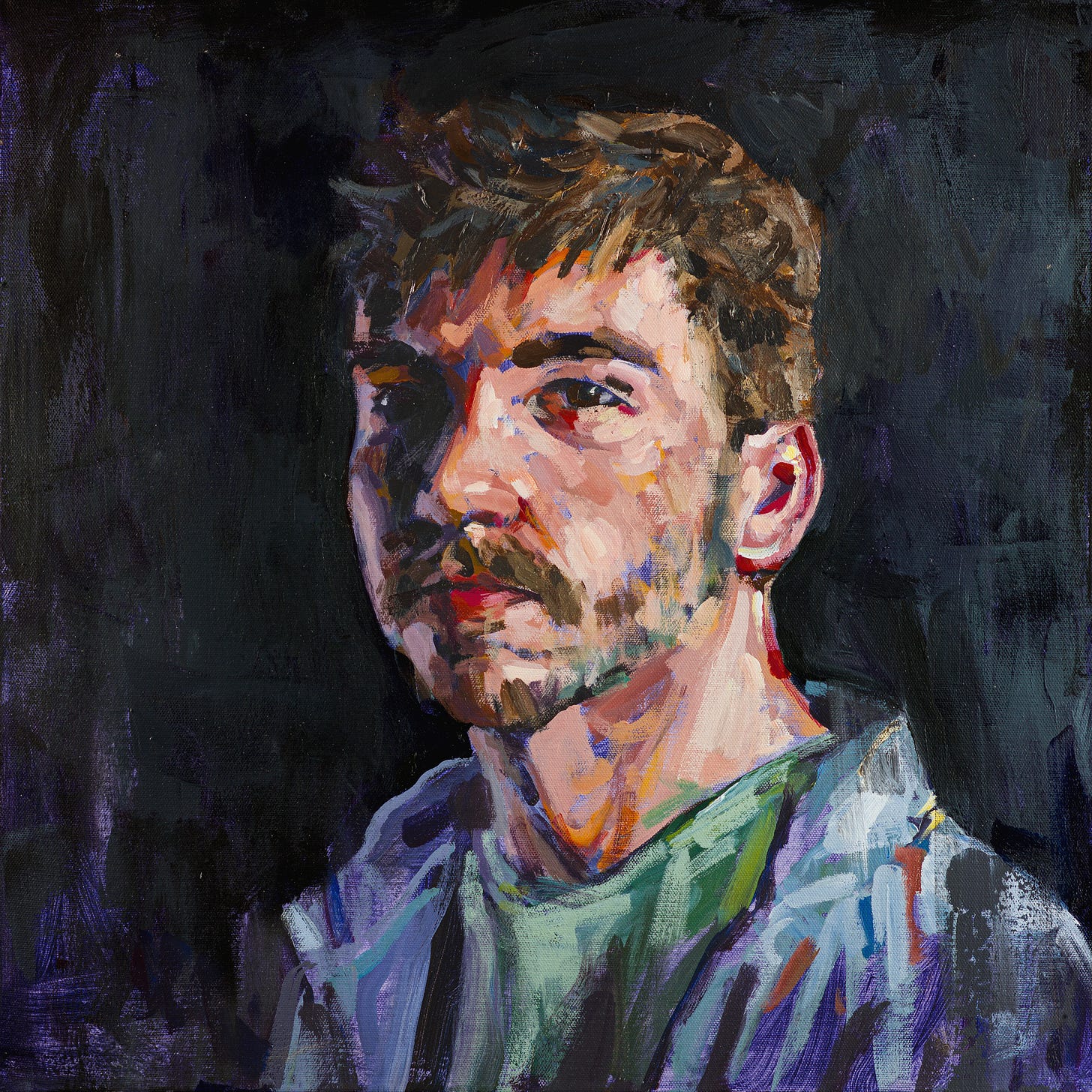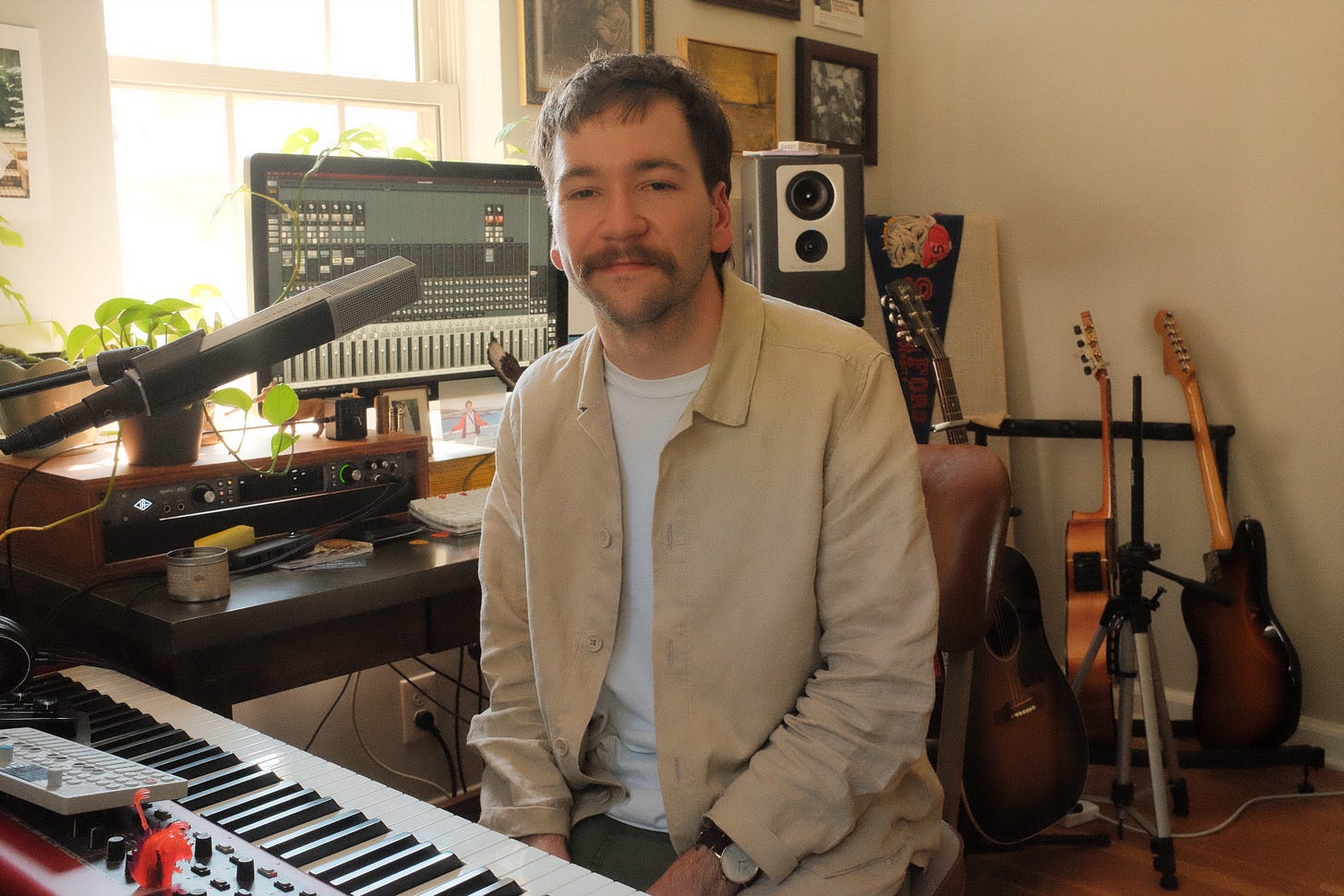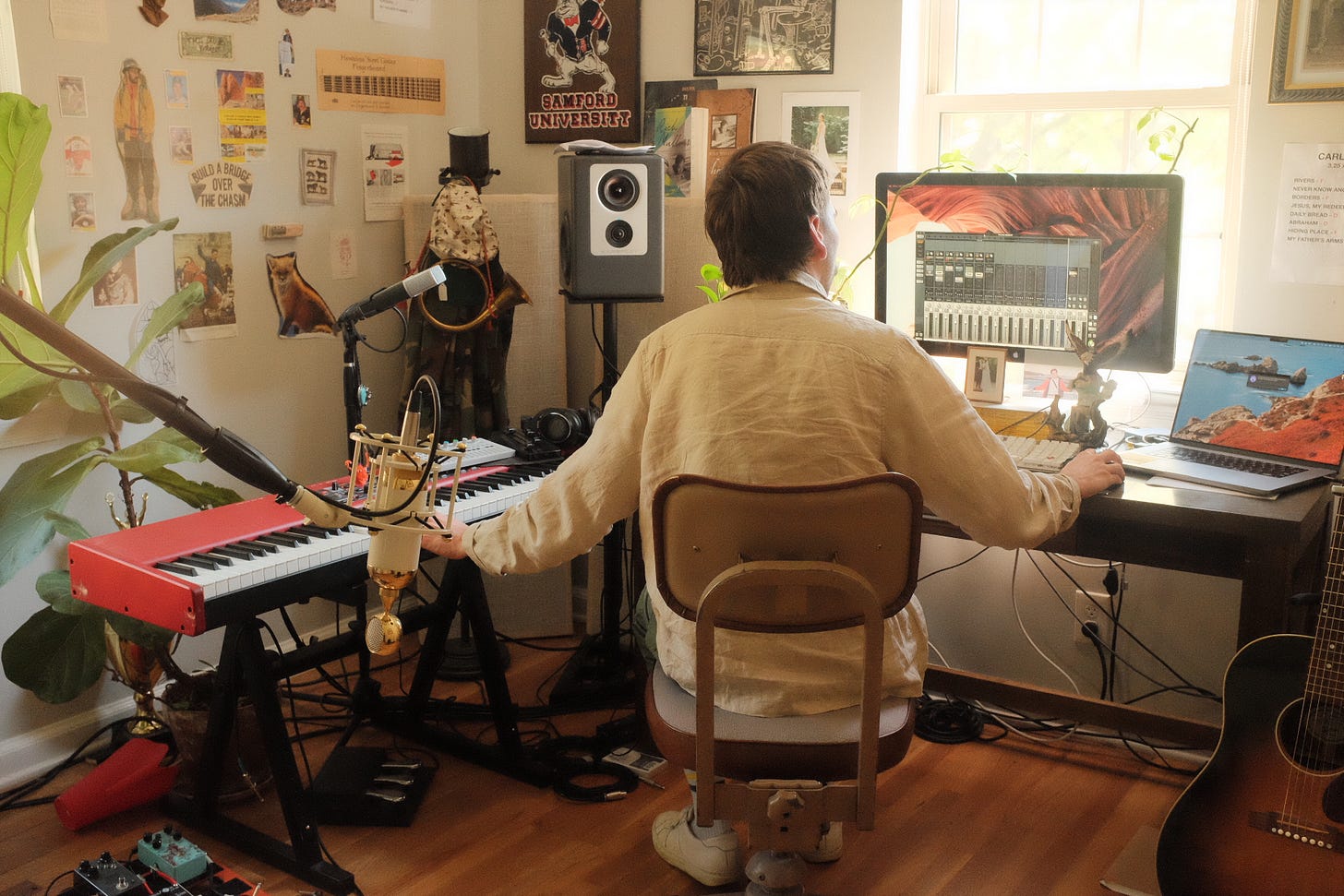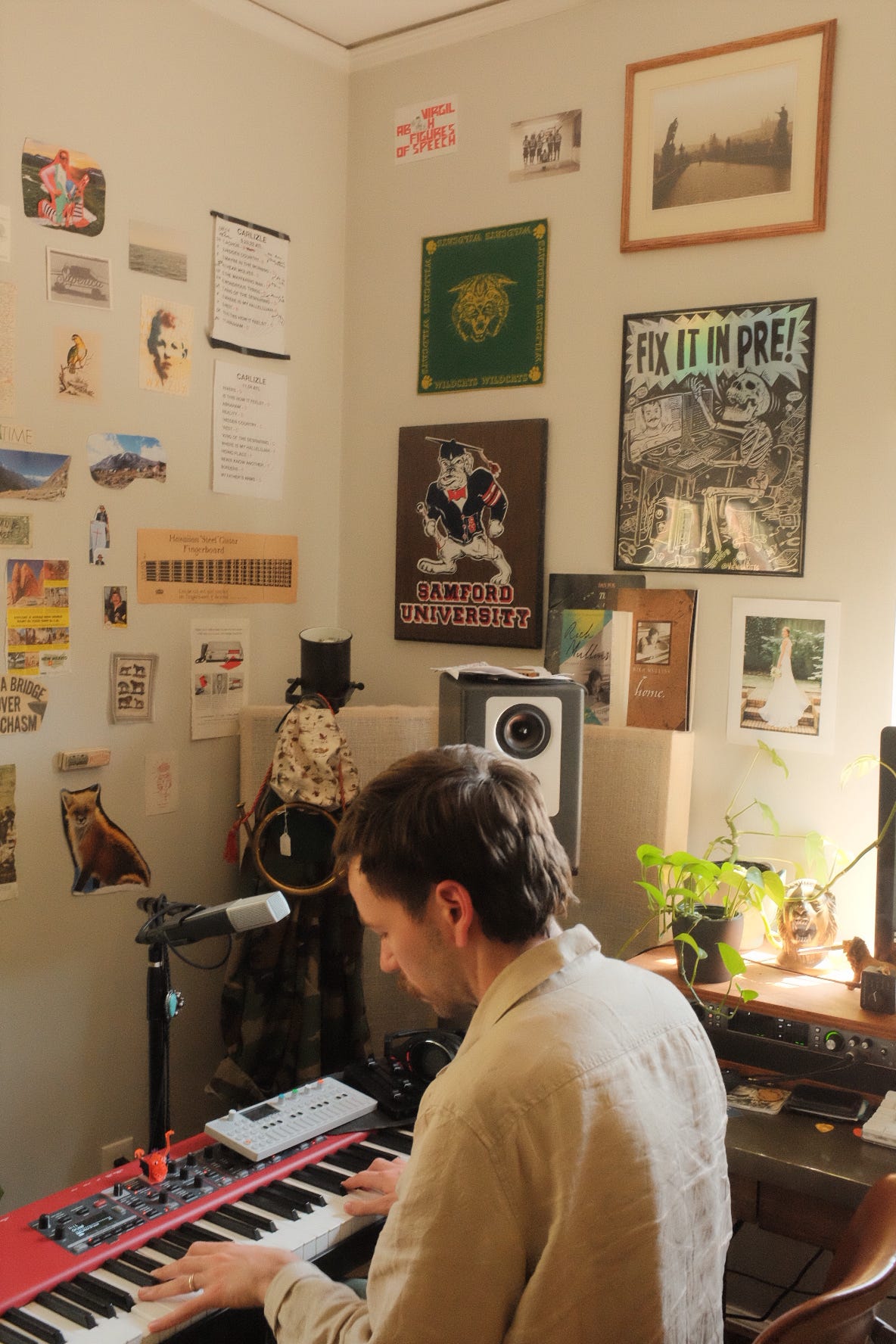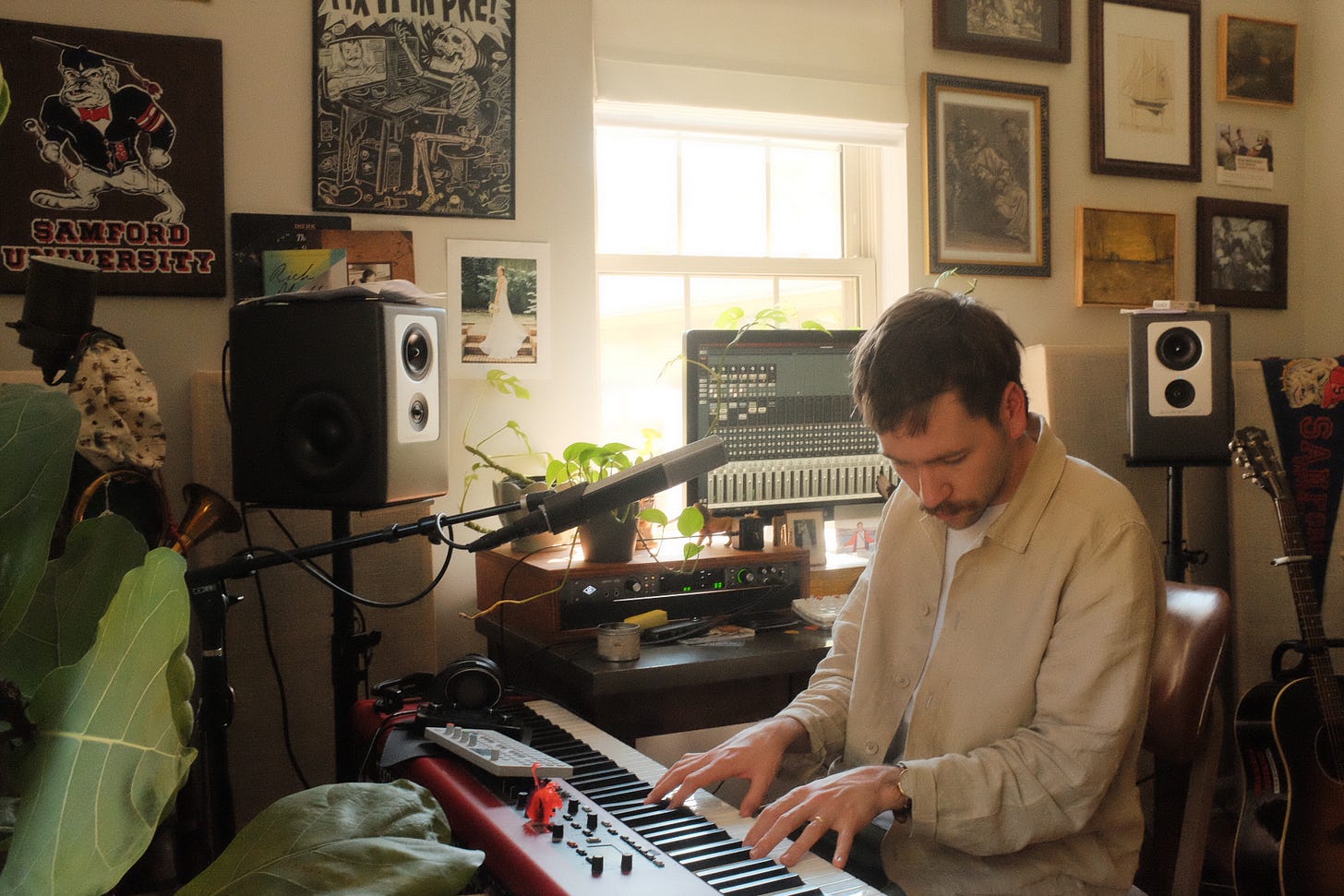After patient waiting, the crocus flower emerges from a snowy retreat, where it multiplies and naturalizes within its local surroundings. These crocus blossoms are life for the winter-weary bee, who is drawn to its priceless pollen, in order to produce its new sweet honey. This is the flower that this record bears the name of, The Crocus
The Crocus is a record written by Will Carlisle, a now local to Atlanta, GA. This album shares the fruit of a laboring christian, fumbling through faith and fiction. In his own personal winter, Carlisle has felt it necessary to find the truth within his life amidst trials of doubt. Through this searching he has now found himself springing forth with a host of hope to enrich the lives of other weary christian believers who have also wrestled along the path of uncertainty. This record seeks to bring the meaning of his faith to others. In order to help the listener know Will’s hope behind it, I sat down with him to discuss The Crocus.
What was the decision behind making this album?
So, in college, I did music that started as a solo thing and then it was me and another guy. Around then I couldn’t really figure out what I wanted it to be, and once another person got involved, it just got complicated and then covid happened, and it just kind of died. I wasn’t producing music at that time and I really didn’t know what I was doing, so I kind of let it die and started learning how to produce music instead. All of this time, basically from late 2019 to 2022, I wasn’t releasing music at all, I was just learning how to make it myself independently. That whole time however I was still writing songs, and also kind of went through a big mental health episode including intrusive thoughts and obsessive compulsive anxieties and things. So I was writing music that whole time, and stockpiling songs, and kind of documenting my experience, and big part of this time for me was questioning whether I actually had a true faith in God or if it was just a belief system that I was too scared to challenge. So naturally I was writing songs about that. While I was writing songs through all of that, I got married to my wife Jenna in 2020 during covid and I think becoming a husband, had me become fearful of losing control of myself and my morality and into spiraling into a terrible person, and so I basically was writing songs that were documenting that. What started out really hard, became a beautiful season of something where I feel like that’s where God really grew me up, and that’s where I actually gained a sense of true confidence in my faith.
I knew I wanted to write the storyline album about this faith journey and process that I’ve been on. So I started with the early songs on this record that are kind of heavy and angsty and then I wrote some resolve and healing songs at the end of the record because that’s kind of what I was working to, but I couldn’t really figured out what changed. I knew I wasn’t in the same spot as I had been but I couldn’t put words on it. I ended up putting “The Crocus” on the shelf for years, but I kept working on it. But then one day, there’s a middle song on the record called fellowship, where I had this aha moment of “I know what the album is about."
When I officially decided to make and finish this album, I was actually home for Christmas of 2022. It was me, one of my sisters and my dad were sitting in the living room where the family piano is, and I was just playing them some stuff that I had been writing and I was actually about to work on a totally different record that I still haven’t made and I was playing them some of those songs, and they were like “oh that’s cool” and then I played them the song called “Abraham” and the opening song of Crocus called “Where Is My Hallelujah” and they were like “holy crap! Where’s this gonna happen?!?” And so I knew “oh this is the album that I need to do right now.”
This has been in development for 4 years now, what’s been the biggest road block?
I think, when it’s all about anger at God, doubt, questioning, deconstruction, whatever you want to call it, and its really documenting my journey through that and into a place of healing, and I think so much christian art that deals with doubt is not empathetic or it’s not resolved if that makes sense. Not that there needs to be complete resolved because I think it should always land in a place of mystery, but I didn’t want it to be “this half is sad songs and this half is happy songs” and I didn’t want it to be “oh, I doubt God but its okay because He loves me” which I think is a lot of worship music or like “I doubt God but I’m gonna praise you anyway,” without any exploration of the concept. So the biggest road block was like “I want my grandparents who have been in ministry for sixty years and some of my friends who don’t identify with religion or God in anyway, I want it to be beautiful and impactful for both parties.” I hope that’ll be somewhat achieved.
Why the name Crocus?
It’s a type of flower. In the northern midwest where there are these long frozen and snowy winters, basically it feels like this perpetual Narnia-esc winter, and the first sign of anything changing are these little purple bulbs that begin to poke their head out of the snow. That’s the crocus flower. So basically this flower that is the first flower to poke up out of the snow and a sign of life surviving winter. I had these songs that I had started writing and I just thought that this was just a profound metaphor for faith. I started reading like flower blogs and stuff like that talked about how the crocus flower doesn’t just survive cold weather but it actually needs the cold to have the fullest harvest. I thought that was so rich because people who have the richest faith are the people who have wrestled with it the hardest. It’s not people who have just floated through this cultural current of evangelicalism but it’s people who have really like met, and questioned and wrestled with and yet fallen in love with God.
How has Schema prepared you for this release?
The first album I did under my name was Hummingbird and then I did Schema 1 and Schema 2. I think there’s a few things it helped me with. When I finished Hummingbird I didn’t have any idea what I wanted to do next. So I sort of got it out there and was paralyzed. But I was reading the Bible one day and it was Proverbs 18:10 “The name of the LORD is a strong tower; the righteous man runs into it and is safe.” So one night before rehearsal I started singing that song and it became this idea of like practicing song writing and I had a bunch of these scripture songs laying around and I was like “I’m kind of bored, so I’m just gonna practice producing music by like using these songs I have laying around.” So basically it started to turn out kind of cool and I was like “I guess I’ll release this.” And it really pushed me to be more imaginative and have more fun producing and then it all set the stage for everything up to Crocus but also clarified for me to bring in other people and push outside the box a little more.
How would you describe this album to a first time listener?
I would say sonically, there’s inspiration from Zach Bryan and Mumford and Sons to obscure Icelandic composers. So it’s got like this folksy driving sometimes soft, sometimes heavy handed musical feel. And then thematically it’s an auto-biographical story that really only makes sense in order. The phrase I’ve been using is about the usually gritty, sometimes gruesome but always beautiful process of walking by faith. So it’s rough around the edges, but hopefully in a beautiful way.
What does your writing process usually look like?
So my ADHD is a big part of this answer. I have like two types of writing, kind of three types, maybe two and a half. One half is schema and stuff like that; the devotional scripture, experimental music that’s kind of its own more like hobby-esc feel. The other type of song writing I do is like worship stuff, the type you sing in church. The worship songs tend to be more systematical with like scheduled writing times and co-writes with people. But this sort of stuff like The Crocus is very random. For one of the songs, I was at the beach with my family, just playing guitar in the arm chair and I had this idea for a song and I voice memo-ed it. So it’s random how the songs originate. A lot of them are outside the box, and it more just kind of shapes up and I find it along the way. The development and refinement process is also random and distracted. A lot of my best lyrical revelations of like “oh this is the missing line,” I would say like ninety percent of that happens when I’m driving, doing the dishes, going on a walk, grocery shopping or whatever. A lot of creative books talk about when our brain is distracted with a mindless task it actually makes us more creative. So yeah, I’d say a lot of the key moments for me are very random.
What do you hope for people to get out of this album?
So the spoiler of the album is the idea of friendship and fellowship with God. A lot of the story of the album could be summed up in throwing away the idea of God as a concept and finding hope and comfort and life in knowing God is a friend. One of the moments in scripture that has left a mark on me is after Christ’s resurrection. Ten of the Apostles have seen Jesus and then Thomas who hasn’t seen him famously says “I’m not gonna believe this has happened until I put my hand inside his wounds.” And Jesus shows up, who had spoken very clearly about His death and resurrection many times and so it would have been a great moment for Jesus to humiliate Thomas or drive him away, never to be seen again in the church and he shows up and says “Thomas why did you doubt me?” But then He inviters him to feel His wounds and believe in Him again. The more that I thought about it, I’m like “Wow, God doesn’t hate us when we like fail to have quick sincere faith in Him but rather He stands there and waits for us to come closer.” So what I want people to take away from this is this idea that God is not a concept and He’s also not, you know, frustrated and glaring at you, but wants you to draw near as a friend.
Why not another genre?
It’s kind of all I know how to do in a way. I have this collection of outlaw cowboy songs that I’ve been writing that maybe I'll do something with someday but for now Jenna and I just kind of sing them around the house and it’s just a fun random thing. But to me I really have to feel the sense of importance behind the music. Not that my genre is the only important genre, because that’s not true at all, but it’s the only thing I know how to make that feels important to me. I also think it’s about being obedient to God and also following my gut in that, what feels like I need to say it. So finding the sense of urgency of like, “I need to make this and this deserves to exist.”
If you would dedicate this album to anyone, who would it be?
I would say probably three parties. First would be Jenna, not just because she’s my wife, but the first song that I wrote for the album was “Where Is My Hallelujah.” We were both in a tough place one day and that song is a song that I kind of just sat down at a piano and wrote the whole song in like fifteen minutes, and it just flowed straight out of the heart, and you have that thought of like “is this any good?” And Jenna came upstairs and I played it for her and she just started weeping and I was like “okay, this is good. It taps into the heart.” So Jenna has been on that journey with me and her DNA is just as much in the album as mine is.
I would say secondarily, my parents. I grew up in a traditional christian world in Birmingham and usually that’s not super harmonious with this kind of music, its actually kind of what this kind of music is critiquing. But my parents, as I’ve grown up, I’ve watched them on a journey too. They’re like rock solid in their faith and convictions and they are like evolving and growing all the time and rather than me feeling uncomfortable of me showing them brutally honest music, they like celebrate it and encourage it. They’ve even given to help produce it along the way. They’ve just been incredibly supportive. Given the demographic I’ve grown up in, most households would not be that supportive, it would be kind of awkward or at least confused like “What’re you talking about? This doesn’t make sense.” But they’ve just been so supportive and it’s such a cool gift to have a family behind it, so I’ll also lump my sisters into that. And my uncle, my mom’s brother, who died during the pandemic. He was like a marathon runner, healthy pastor guy, and it was very tragic. And on Abraham, the third verse says “Some days I feel like Martha by her brother’s grave. Blaming you for breaking promises, asking why you never came.” And when I tracked that vocal the first time, I almost broke down singing that because I thought about my mom at my uncles funeral, and her as that Martha figure and that first take is like actually the one I still have in for that verse, so you can hear that emotion.
Third, is really like who I made the album for. Everything I made in the past, I made for as wide of an audience as I could. And this album, I have a few friends who would not identify with religion or with Jesus in any real way, but they’re so dear to my heart and they’re actively seeking truth. And I want them to like see God’s heart for them. So throughout the album, whenever I would grow jaded, frustrated or discouraged with the creative process, I would just remember I’m not making this for the whole world, I’m making this for like a handful of friends.
What did you learn about yourself while waiting on this?
A whole lot. I think I learned how blessed I am by the people around me and how that’s the most important asset in my life. I often think about the quote in “It’s a Wonderful Life.” “Remember George, no man is a failure who has friends,” and I feel like the conception of this album, the making of it, the creation process and encouragement and discouragements along the way, I was carried through it all by an amazing church community and family. So I think I learned how dependent I am on the people that God has put around me, and that’s really all that I have in life, is fellowship with God and the people that He has put around me. I think I also really learned that I aspire to a very transparent and honest life and I hope to always maintain that because the more honest and transparent that I’ve been about my journey with God and things that I question and wrestle with, even sometimes if I feel like I’m stepping out on a limb, Ive actually found that within my spiritual community, that’s met with resonance, like other people feel what I feel and the honesty is loved and cherished. There’s just like light and God’s presence all over that. One of my friends who helped in making this record, who’s a deconstructed church musician, he used to be a music director at a church, but now has no religious affiliation. He asked me after we finished the album and found out that I work at a church, “Is that weird for you? Do you have to keep this kind of stuff D.L.? Have you ever gotten in trouble?” And I could say “No, my church is actually the most supportive part of this whole process besides my family and Jenna.” And he was like blown away by that. I think that just reminded me that I want to live an honest transparent life because when we all do that together, it bares witness to grace. So what I learned is I’m very dependent on the goodness of God that’s shown through the people around me and that I really desire to live a transparent and honest life.
You can listen to the latest singles "Abraham" and "You Will Find A Friend In Me" now on your preferred listening platform.
His next single from the record will be out April 26th, and you can hear the entirety of “The Crocus” releasing May 10th 2024.



